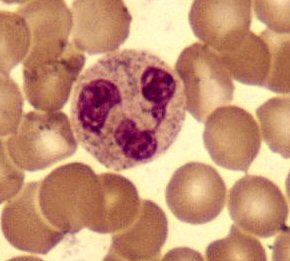Granulocyte
(Redirected from Granulocytes)
Granulocyte
Granulocytes are a category of white blood cells characterized by the presence of granules in their cytoplasm. These granules contain enzymes that are released during infections, allergic reactions, and asthma. Granulocytes are part of the innate immune system and play a crucial role in the body's defense against pathogens.
Types of Granulocytes[edit | edit source]
Granulocytes are divided into three main types based on the staining properties of their granules:
Neutrophils[edit | edit source]
Neutrophils are the most abundant type of granulocytes and the most abundant type of white blood cells in most mammals. They form an essential part of the innate immune system. Neutrophils are typically the first responders to microbial infection; their activity and death in large numbers form pus.
Eosinophils[edit | edit source]
Eosinophils are responsible for combating multicellular parasites and certain infections in vertebrates. They also control mechanisms associated with allergy and asthma. The granules of eosinophils contain a variety of enzymes and toxic proteins that are released upon activation.
Basophils[edit | edit source]
Basophils are the least common type of granulocyte and are involved in inflammatory reactions, particularly those that cause allergic symptoms. They contain large cytoplasmic granules which obscure the cell nucleus under the microscope when stained.
Function[edit | edit source]
Granulocytes are involved in the body's defense against pathogens. They are part of the innate immune system, which is the first line of defense against invading pathogens. Granulocytes are capable of phagocytosis, a process by which they engulf and digest microorganisms and cellular debris.
Development[edit | edit source]
Granulocytes are derived from hematopoietic stem cells in the bone marrow. The process of granulocyte development is known as granulopoiesis. During this process, hematopoietic stem cells differentiate into myeloid progenitor cells, which then further differentiate into the various types of granulocytes.
Related Pages[edit | edit source]
Search WikiMD
Ad.Tired of being Overweight? Try W8MD's NYC physician weight loss.
Semaglutide (Ozempic / Wegovy and Tirzepatide (Mounjaro / Zepbound) available. Call 718 946 5500.
Advertise on WikiMD
|
WikiMD's Wellness Encyclopedia |
| Let Food Be Thy Medicine Medicine Thy Food - Hippocrates |
Translate this page: - East Asian
中文,
日本,
한국어,
South Asian
हिन्दी,
தமிழ்,
తెలుగు,
Urdu,
ಕನ್ನಡ,
Southeast Asian
Indonesian,
Vietnamese,
Thai,
မြန်မာဘာသာ,
বাংলা
European
español,
Deutsch,
français,
Greek,
português do Brasil,
polski,
română,
русский,
Nederlands,
norsk,
svenska,
suomi,
Italian
Middle Eastern & African
عربى,
Turkish,
Persian,
Hebrew,
Afrikaans,
isiZulu,
Kiswahili,
Other
Bulgarian,
Hungarian,
Czech,
Swedish,
മലയാളം,
मराठी,
ਪੰਜਾਬੀ,
ગુજરાતી,
Portuguese,
Ukrainian
Medical Disclaimer: WikiMD is not a substitute for professional medical advice. The information on WikiMD is provided as an information resource only, may be incorrect, outdated or misleading, and is not to be used or relied on for any diagnostic or treatment purposes. Please consult your health care provider before making any healthcare decisions or for guidance about a specific medical condition. WikiMD expressly disclaims responsibility, and shall have no liability, for any damages, loss, injury, or liability whatsoever suffered as a result of your reliance on the information contained in this site. By visiting this site you agree to the foregoing terms and conditions, which may from time to time be changed or supplemented by WikiMD. If you do not agree to the foregoing terms and conditions, you should not enter or use this site. See full disclaimer.
Credits:Most images are courtesy of Wikimedia commons, and templates, categories Wikipedia, licensed under CC BY SA or similar.
Contributors: Prab R. Tumpati, MD



